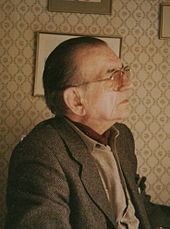Hermann Stahl (writer)
Hermann Stahl (born April 14, 1908 in Dillenburg as Hermann Wilhelm Stahl , † April 14, 1998 in Starnberg ) was a German painter and writer .
Life
Hermann Stahl was the son of a decoration and church painter . After high school, Stahl studied painting from 1927 to 1929 at the Kunstgewerbeschule in Kassel and from 1929 to 1932 at the Munich State University of Applied Arts. He worked as a painter, graphic artist and set designer . From 1929 he belonged to the artist group “Die Juryfrei” and exhibited his first paintings in the Munich Glass Palace .
After the National Socialist “ seizure of power ”, the new rulers imposed a painting ban on the allegedly “ degenerate ” artist in 1933 . Stahl retired to his homeland in the West Forest and turned to literature. From 1937 he lived as a freelance writer in Dießen am Ammersee . In the poem "Der Fuehrer" in an anthology dedicated to Adolf Hitler on his birthday in 1939 , Stahl paid homage to the dictator and called him one of the gods chosen to save the German people. A number of his narrative works were published by German publishers by 1943. Since Stahl's books not only passed the Nazi censorship , but were occasionally even awarded state prizes , but on the other hand the author allegedly maintained a marked distance from National Socialism and even barely escaped proceedings before the “ People's Court ” in 1944 , his role during the Third Reich remains controversial.
After the end of the Second World War , Stahl initially devoted himself to painting again, before again shifting the focus of his artistic work to literature from 1947. At the end of the 1970s, Stahl turned to painting again and this time for good.
Hermann Stahl's literary work includes novels , short stories , poems and radio plays . While in the works published before 1945 the focus is often on the landscape and people of the Westerwald , most of Stahl's post-war works are time novels , which deal with the social and psychological changes in the early Federal Republic .
Hermann Stahl was one of the founders of the German Academy for Language and Poetry in Darmstadt in 1949 ; he was also a member of the German PEN Center . Stahl received u. a. 1936 the Immermann Prize of the City of Düsseldorf , 1943 the Gau Culture Prize Hessen-Nassau , 1969 the Prize for Epic of the City of Munich , 1981 the Tukan Prize , 1982 the Federal Cross of Merit on Ribbon and in 1992 the Culture Prize of the City of Dillenburg. He died on his 90th birthday in a Starnberg hospital. His written estate is kept safe by the Berlin Academy of the Arts .
Works
- Dream of the earth , Hamburg 1936
- In front of the ajar door , Hamburg 1937
- The root under the grass , Hamburg 1938
- The runner , Jena 1939
- The organ of the woods , Jena 1939
- The homecoming of Odysseus , Jena 1940
- Crossing , Jena 1940
- Grass and poppy seeds , Jena 1942
- Licht im Brunnengrund , Jena 1942
- The journey into yesterday and tomorrow , Munich 1942
- The tide rises slowly , Jena 1943
- An everyday voice , Düsseldorf 1947
- When the bell rings , Düsseldorf 1948
- The mirror doors , Hamburg 1951
- Where are you going , Bremen 1954
- Cloud trail , Bremen 1954
- Eternal echo game , Bremen 1955
- Wild pigeon call , Berlin 1958
- Beyond the Years , Munich 1959
- Days of Schlehen , Munich 1960
- Exact time requested , Munich 1961
- A homecoming. Early wind , Stuttgart 1961
- Ocher , Darmstadt 1961
- Strand , Cologne 1963
- Marie-Katrin , Hamburg 1965
- Doors from Wind , Freiburg i. Br. [U. a.] 1969
- Poems from four decades , Darmstadt 1977
- Das Pfauenrad , Stuttgart 1979, ISBN 978-3-12-907490-9
- Autumn closing , Bielefeld. ISBN 978-3-929096-08-8
literature
- Josef Schäfer: Symbolic landscape in the poetry of Hermann Stahl. Bonn 1959.
- The river flowed almost silently . In: Die Zeit , No. 33/1948
Web links
- Literature by and about Hermann Stahl in the catalog of the German National Library
- Hermann Stahl ( Memento from February 9, 2009 in the Internet Archive ) on geheli.de
- Hermann Stahl Archive in the Archive of the Academy of Arts, Berlin
Remarks
- ↑ according to Munzinger archive ; Brockhaus and the German National Library , on the other hand, state Dießen am Ammersee as the place of death.
- ↑ To the Führer. Poems for Adolf Hitler. Edited by Karl Hans Bühner . 3rd ext. Aufl. Truckenmüller, Stuttgart 1942. - In a letter to Paul Celan in 1964 , Paul Schallück commented on these facts with: “Well then! It was hardly to be expected otherwise ”(Paul Celan: Correspondence with friends from the Rhineland. Heinrich Böll, Paul Schallück, Rolf Schroers . Suhrkamp Verlag Berlin 2011 ISBN 978-3-518-42257-1 , p. 336).
- ^ Karl Ude : The city awards its Tukan prizes in: Süddeutsche Zeitung of July 7, 1981
| personal data | |
|---|---|
| SURNAME | Stahl, Hermann |
| ALTERNATIVE NAMES | Stahl, Hermann Wilhelm (birth name) |
| BRIEF DESCRIPTION | German painter and writer |
| DATE OF BIRTH | April 14, 1908 |
| PLACE OF BIRTH | Dillenburg , Hessen, Germany |
| DATE OF DEATH | April 14, 1998 |
| Place of death | Starnberg |
